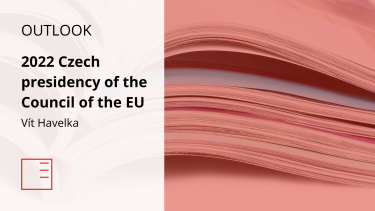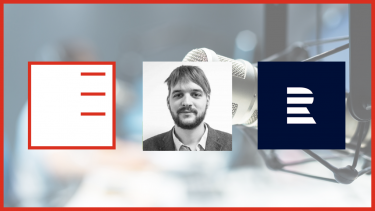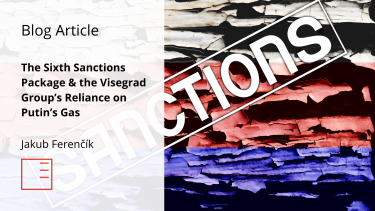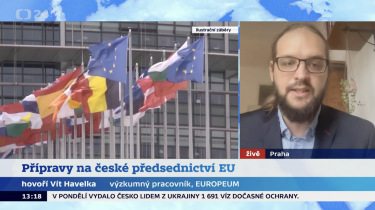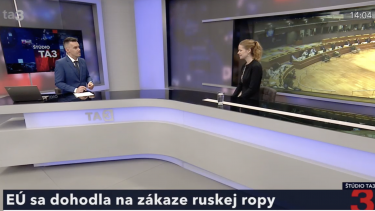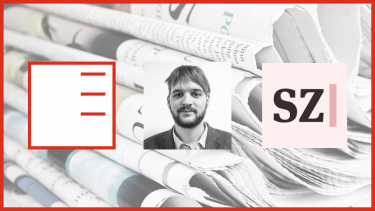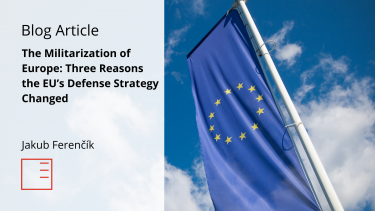ČRo Plus: Ukraine's integration into the European Union and the role of the Presidency in these processes
The head of our Brussels office, Žiga Faktor, commented for ČRo Plus on the Czech Republic's position as the presiding country in Ukraine's EU accession talks. In his commentary, he mentioned what is the decisive factor for the length of the accession talks and whether it is possible to change these procedures during the state of war.
Show more
OUTLOOK: 2022 Czech presidency of the Council of the EU
Our senior research fellow Vít Havelka has written an OUTLOOK entitled "2022 Czech Presidency of the Council of the EU", where he analyses the future course of the Czech Presidency and the biggest challenges. In his paper, he focuses on two levels of the Presidency's work, namely the political and legislative agenda.
Show more PDF
INVITATION: A more sovereign European Union in the new geopolitical age? A first assessment after the French Presidency of the Council
We would like to invite you to a conference titled "A more sovereign European Union in the new geopolitical age? A first assessment after the French Presidency of the Council" on Tuesday 28 June at 11:00 CET online via ZOOM. The conference will be held in English. The event is organized by the Europeum Institute for European Policy, Austro-French Center, the Institut Montaigne, GLOBSEC, the French Embassy to Austria and the Austrian Society for European Politics.
Show moreČRo Evropa Plus: Czech Republic is ready for the EU Presidency, says analyst. The fact that there won't be a second Entropa is a good thing, he says
The Czech Republic will take over the six-month presidency of the Council of the European Union on 1 July. How is the Czech Presidency prepared for its task and how will it cope with the challenges posed by the Russian invasion of Ukraine? In an interview for ČRo, our senior research fellow Vít Havelka commented on the topic.
Show more
BLOG: The Sixth Sanctions Package & the Visegrad Group’s Reliance on Putin’s Gas
Jakub Ferenčík wrote a blog on the current topic: The Sixth Sanctions Package & the Visegrad Group’s Reliance on Putin’s Gas. Russia's aggression in Ukraine has necessitated another package of sanctions, this time in the energy sector. Due to the lack of alternatives for gas supplies, the Visegrad Four countries had a problem with the implementation of the latest sanctions package. In the end, the EU found a consensus and introduced exemptions for the Czech Republic, Slovakia and Hungary.
Show more PDF
ČT24: Preparations for the Czech EU Presidency
Vít Havelka, a research fellow at the Europeum Institute, spoke on ČT24's Studia programme about preparations for the Czech EU Presidency, which begins in July. Havelka's main focus is on the change in the role of the presidency from 2009. Now it is mainly about negotiating new European legislation than it was before. Furthermore, he also presented the direction of the Czech Republic in the legislative process and mentioned political priorities, where one of the main topics will be the war in Ukraine.
Show more
Studio TA3: The European Union has agreed on a partial ban on Russian oil. How will this affect the Slovak economy?
Our Associate Research Fellow Zuzana Stuchlíková gave an interview for Slovak TV TA3. Zuzana Stuchlíková talks about the process of approving the latest EU sanctions package against Russia and the ban on Russian oil imports. She discusses how the negotiations went, how the exemptions for Central Europe will work, what it means for fuel prices and what will happen next.
Show more
Seznam Zprávy: Czechs are happy to be in the EU, but for the young Czechs Chexit is unthinkable
Our research fellow Vít Havelka commented for Seznam Zprávy. In the article, Vít Havelka mentions the future Czech EU Presidency and the possibility of Ukraine becoming a member of the European Union. The article also includes the results of a survey conducted by the platform Výzkumník Seznam.
Show more
EU MONITOR: The European Union’s Position Toward Ukraine’s EU Membership
Jakub Ferenčík wrote the EU Monitor on "The EU's stance on Ukraine's EU membership", where he discusses Ukraine's potential membership in the EU. Ferenčík also discusses the process of transitioning to EU membership and compares it to a similar process faced by some other countries, notably Serbia. In his work, the author discusses some of the factors of the transition process, from subscribing to EU values such as "human dignity, freedom and equality" to creating an area of "prosperity and neighbourhood".
Show more

BLOG: The Militarization of Europe: Three Reasons the EU’s Defense Strategy Changed
Jakub Ferenčík wrote a blog on the topic: The Militarization of Europe: Three Reasons the EU’s Defense Strategy Changed. In his blog, he writes for example about three reasons why the EU defence strategy has changed or the militarisation of Europe and the future of deterrence.
Show more PDFStaroměstské náměstí 4/1
Prague 1 - Staré Město
110 00
tel.: +420 212 246 552
email: europeum@europeum.org
https://www.europeum.org

